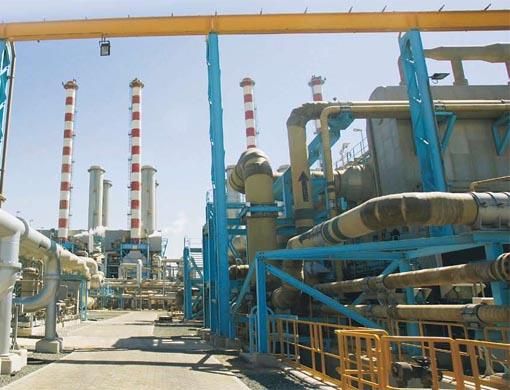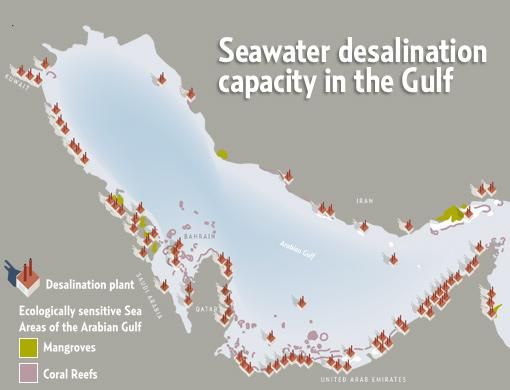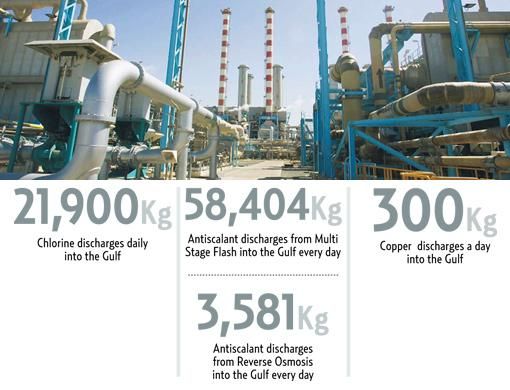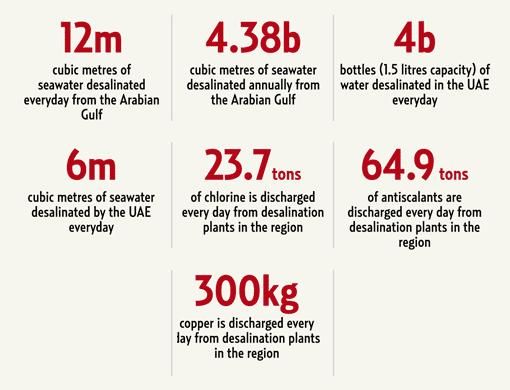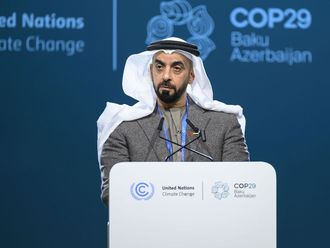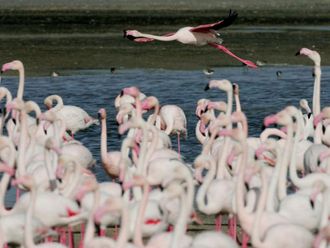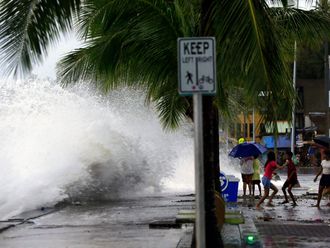Dubai: Every time desalination plants dump tons of brine carrying chemicals into the Arabian Gulf, sea temperatures rise by 10 degrees Celsius, according to researchers.
This is having life-threatening effects on the marine ecosystem in the region.
More than 12 million cubic metres of sea water, equivalent to 4,800 Olympic swimming pools, are desalinated daily in this region.
The UAE, Qatar, Bahrain, Saudi Arabia, Kuwait and Iran have 120 desalination plants between them. These plants flush nearly 24 tons of chlorine, 65 tons of algae-harming antiscalants used to descale pipes, and around 300kg of copper into the Arabian Gulf every day.
This chemical mixture is affecting seabed organisms and making its way up the food chain. Researchers say the Arabian Gulf is the water body most threatened by desalination.
Removing salt from sea water to provide safe drinking water has allowed severely water-scarce countries to prosper, but the energy intensive desalination process has a definite impact on the marine environment.
According to European studies, the largest number (120) of sea water desalination plants draw water from the Arabian Gulf, and work around the clock to desalinate just under half (44 per cent) of worldwide daily production.
The recently released Arab Environment: Future Challenges 2009 report by the Arab Forum for Environment and Development (AFED) and Environment Agency Abu Dhabi (EAD) echoes this, highlighting that power plants cause thermal pollution and desalination plants release chlorine, brine and thermal loads into sea water.
Mohammad Dawood, acting manager of Water Resources Management at EAD, confirmed that impacts of desalination effluents on the local marine ecosystem are being felt. A link to red tide and brine has not been strictly ruled out either.
"There is no monitoring of long-term effects of desalination. EAD is looking at starting a project to assist and monitor desalination plants. We will check salinity, chemicals, enzymes and brine around the outlet and make better models for dilution," he told Gulf News.
"Organisms and coral reefs are being affected near the coastlines and are dying ... Brine can increase the normal sea temperature by up to 10 degrees Celsius, which has a huge effect on the marine ecosystem."
The marine environment of the Gulf has been degraded over recent years as a result of a wide range of land-based pollution sources and man-made activities.
Are you worried by the issue of desalination? Are you aware of the impact it has on the environment? Do you have any suggestions for an alternative?
Your comments
Yes i agree with the sea water quality. I have been in UAE for 1 year and witnessed many beaches and corniche seriously polluted alot like the corniche is full of garbage.last summer i see alot of dead fish float in the corniche and beaches.Hope fully it will be better.
Pradheepan Raghavan
Sharjah,UAE
Posted: June 15, 2009, 19:10
They should provide a plant to reduce discharge chemical (Chlorine, antiscalant) from disalination plants to sea so that it will minimize a huge effect on the marine ecosystem. The authority should implement the rule to this issue.
Teody
Abu Dhabi. UAE,Abu dhabi . U.A.E
Posted: June 15, 2009, 15:52
Water is the most important commodity in the world. the GCC has the right to have good clean drinking water and the responsibility to protect the environment. I have a solution for this issue. A patented and licensed technology for water desalinisation with zero pollution discharge.
Ali Esshaq
Boca Raton,USA
Posted: June 15, 2009, 11:39
I am worried indeed. the amount of water used for desalination per day is so huge that it will have an impact on the environment. the amount of fossil fuel used for desalination will add more pollution. the recent red tide is due to man made isult on our planet. all water bodies were our lives and let us protect it, whether it is a sea, river, spring, glacier, lake, rain water or underground water. Use only minimum water as far as possible and prserve it for future generations to come.
Dr Sajan K. Hanif
Dubai,UAE
Posted: June 15, 2009, 11:27
It is very important to study the chemical components being used and some technology is required to convert brine into some other components instead of releasing back to the sea.
Saqeer S. V.
Dubai,UAE
Posted: June 15, 2009, 10:45
Though I'm a lay person, immediately what comes to my mind are 3 things (whether they are do-able ore energy intensive i'm not sure) 1) Extract the copper before the effluents are released 2) Reduce the temperature of the effluents before release 3)Direct the salt deep into the sea bed so that it's release at slow levels back into the sea
Hope we are able to collectively come up with some solutions to this problem.
Vyjayanthimala Jacobs (Viji)
Dubai,UAE
Posted: June 15, 2009, 10:34
I wonder if maybe the antiscalant waste can be dumped in land fills in the desert instead of the oceans. this however should be experimented on a small area to see if any damage is done before going ahead in a big way. the desert does have its own plant, animal and insect life that should not be victims to our irresponsibility to the environment. if however they are biodegradable substances, the nitrogen cycle works like magic and this may be the answer. experiments must be carried out first. the chlorine and copper can be recycled I am sure.
Venetia
Dubai,UAE
Posted: June 15, 2009, 09:43
I have just one question to the suppliers of such desalination plants; dont they know the harmful effects of the technology?
So, why couldnt they provide a recycling process for such harmful residues and reduce/eliminate the catastrophic effect on mother nature.
Joe
Dubai,UAE
Posted: June 15, 2009, 09:31
Yes i totally agree with the down graded quality of the sea here. I was kiting since 5 years and i can confrim you that the beaches are seriously polluted.Hope fully it will be better.
Djamel Amalou
Dubai,UAE
Posted: June 15, 2009, 09:07
The recent study results of the marine environment are getting shocked and alarming the human beings. Definitely, authorities should take the similar steps to reform the balancing ecosystem in future.
Mujibur
Dubai,UAE
Posted: June 15, 2009, 08:51


